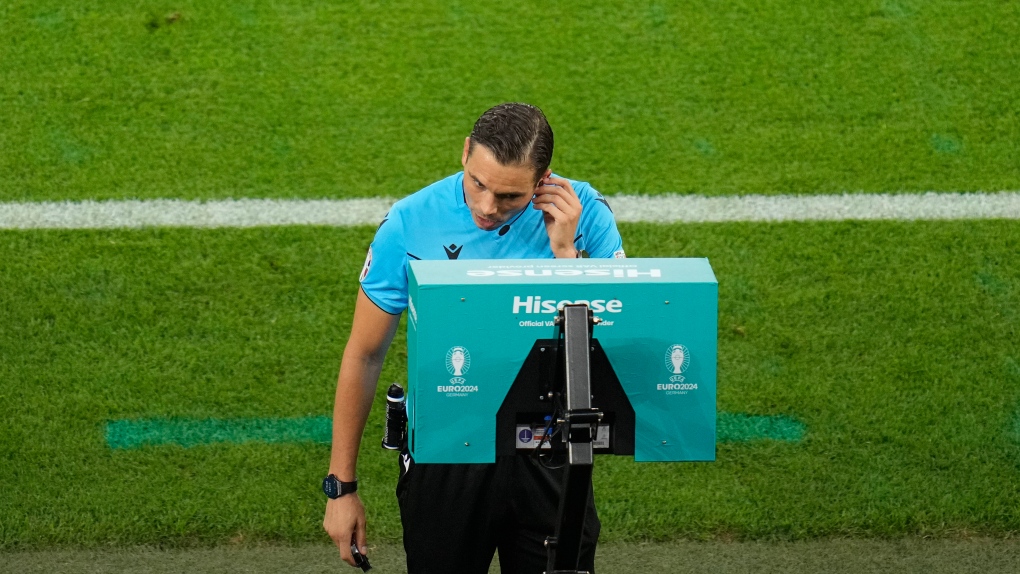Düsseldorf, Germany –
From smart match balls and artificial intelligence to cryogenic recovery chambers, football is being transformed by cutting-edge technology available to players, coaches and officials.
This was evident at Euro 2024, with advancements in areas such as equipment and sports science being rolled out both on and off the field to improve the match, the fan experience and player welfare.
Not everything is acceptable to everyone.
For example, just as there were complaints about decisions before the introduction of VAR, there are still complaints about the Video Assistant Referee's decisions.
Either way, the world's most popular sport continues to be influenced by rapidly developing technology around the world.
The right decision
VAR's decisions have generally worked smoothly here, with UEFA saying the average time for a decision was 51 seconds – five seconds quicker than in last season's Champions League.
UEFA is using semi-automated offside technology, AI and Adidas connected ball technology to speed up the decision-making process and improve accuracy.
Each hosting stadium is fitted with 10 cameras that UEFA says will track 29 points on each player's body. Combined with the official tournament ball, which is fitted with sensors to detect any contact, and AI, the decision-making process should be quicker and more reliable than ever before.
Perhaps too conclusively for some: Belgium's Romelu Lukaku had three goals ruled out in his first two games, two for offside and one for a handball by team-mate Reus Openda in front of goal that was detected by a ball sensor.
Goal-line technology has put an end to the debate over whether the ball has crossed the goal line. Seven cameras are installed at each goal, and when the ball crosses the goal line, a signal is sent to the referee's watch, which vibrates. UEFA says the decision is sent within one second of the start of the match.
ball
The official match ball of the Euros, the Adidas Husbaribe, is not only useful for determining offside but also seems to be popular with players.
The ball is made from materials including recycled polyester, corn fiber, sugarcane and wood pulp, and players are talking about the speed and distance it produces.
That seems evident judging by the number of spectacular long-range goals scored during the group stage, including Arda Güler's curling shot from around 20 metres out in Turkey's 3-1 win over Georgia.
Wearables
Coaches are trying to find an advantage wherever they can.
England players have been spotted wearing smart rings.
“The idea is to help monitor sleep, which is the most important aspect of recovery,” England manager Gareth Southgate said. “So no matter what other things in the world are invented, the best thing to help recovery is sleep and nutrition. We're not checking on the players, but we're allowing them to monitor their own recovery.”
Cristiano Ronaldo is an ambassador for the band, which monitors biometric data such as sleep and cardiovascular and muscular strain.
Tracking vests have long been used to measure the distance traveled by athletes.
Southgate is also wearing a smartwatch that retails for $6,500, which has its own tracking capabilities and provides score alerts during the tournament.
One of the more surprising wearables was Kylian Mbappe's custom protective mask, which the France striker needed after breaking his nose in the opening match.
process
The team is equipped with an array of recovery equipment to help players cope with a packed tournament schedule.
Spain's base camp in Donaueschingen is equipped with hyperbaric oxygen chambers, cryogenic chambers and phototherapy beds to speed up muscle recovery after training and competitions.
In a hyperbaric oxygen chamber, you breathe in 100% pure oxygen. Cryotherapy uses cold temperatures, and phototherapy uses light.
“After the intense matches at the Euros this will work great and we will take advantage of anything that gives us an edge,” Spain forward Nico Williams said on Instagram.
England captain Harry Kane uses air compression boots to massage players' legs and improve blood circulation.
downtime
During long tournaments, boredom can be a major issue as players spend time away from home, family and friends.
It's common to see players arriving at the stadium wearing cutting-edge noise-cancelling headphones, but not all are using the latest tech. England's Cole Palmer wore a pair of wired earbuds.
Personal devices are a necessity, with smartphones, tablets and games consoles often at hand – Germany's Kai Havertz was seen carrying a popular video game console as he got off the team bus.
The German base in Herzogenaurach also has a giant movie screen next to the outdoor pool.
The devices aren't just for fun and diversion: For 16-year-old Spain winger Lamine Yamal, some of his free time is spent doing his homework on a tablet.



